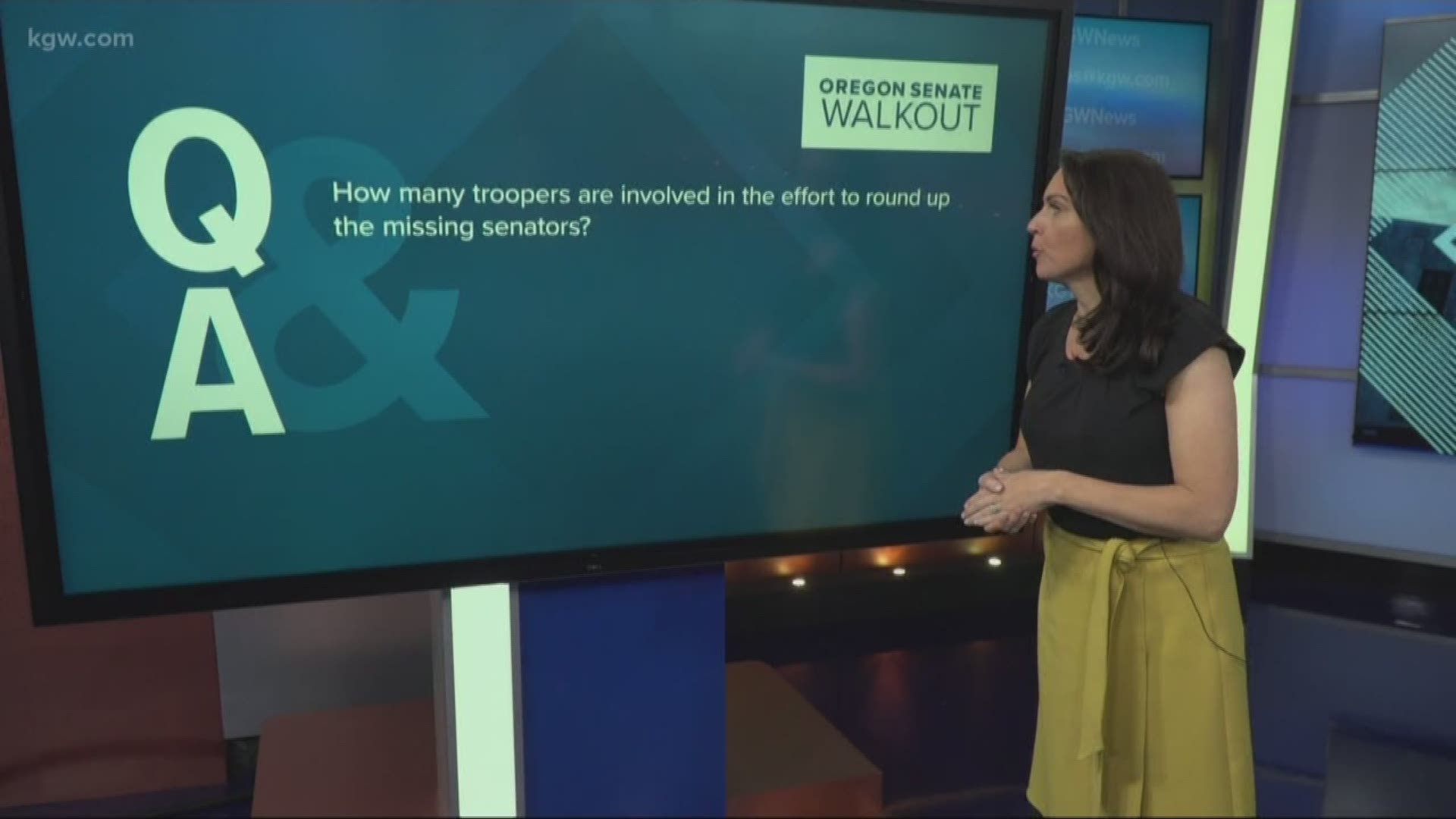SALEM, Ore. — Gov. Kate Brown on Thursday authorized Oregon State Police to round up GOP senators who have staged a walkout in protest of the cap-and-trade energy conservation bill that pushes Oregonians to lower pollution by ditching fossil fuel engines.
Democrats in Oregon control both the House and the Senate. Democrats have an 18 to 12 majority in the chamber, but need 20 members present for a quorum. One GOP senator recently died and has not yet been replaced.
In order to get a quorum, Brown took the rare step of directing OSP to provide assistance with bringing senators back to the Capitol.
Friday morning, the agency was mum on the details of bringing back senators.
In a prepared statement, the OSP said the governor's directive has not affected responses to emergency calls. No senators have been brought back to Salem by troopers, it said.
Several senators have been in contact with the OSP but the agency declined to comment further. They also declined to answer questions on the costs of the roundup or if other police department were assisting in the search.
Given the uncommon nature of the request, KGW asked OSP how the agency will go about finding senators, and potentially bring them back to Salem. Here's what Captain Tim Fox had to say:
What statute gives Gov. Brown authority do direct Oregon State Patrol to go after legislators?
Article IV, section 12 of the Oregon Constitution and Senate Rule 3.01(2) provides the Senate can compel the attendance of members to establish a quorum. The Oregon State Police, at the direction of the Governor, may assist the Sergeant-at-Arms by returning absent members. Under the authority of ORS 181A.090, (The state police, with the approval of the Governor, may be called upon by any other branch or department of the state government to enforce criminal laws or any regulation of such branch or department. [Formerly 181.050] ) Governor Brown directed the State Police Superintendent to attempt to return absent members.
How many senators and who has OSP contacted so far?
The agency has been in contact with several senators, the details will not be disclosed at this time.
How many OSP personnel and what resources are being utilized?
The OSP declines to address in-state and out-of-state resources at this time, in addition to technical mechanisms for investigative purposes.
Will OSP troopers physically arrest or handcuff senators?
The OSP will go to great lengths to avoid this scenario and no physical contact is permitted, absent the permission of the Superintendent of OSP.
Are out of state resources assisting OSP?
Yes, no additional comment.
Is there a deadline or timeline on this?
No.
In a press release on Thursday, OSP said it hopes to have a peaceful role in bringing the political standoff to an end.
“While we obviously have many tools at our disposal, patience and communication is and always will be our first, and preferred, option," OSP said.
Cap-and-trade bill
Under the proposed cap-and-trade bill, Oregon would put an overall limit on greenhouse gas emissions and auction off pollution "allowances" for each ton of carbon industries plan to emit. The legislation would lower that cap over time to encourage businesses to move away from fossil fuels: The state would reduce emissions to 45% below 1990 levels by 2035, and 80% below 1990 levels by 2050.
Democrats say the measure is an efficient way to lower emissions while investing in low-income and rural communities' ability to adapt to climate change. It has the support of environmental groups, farmworkers and some trade unions.
Those opposed to the cap-and-trade plan say it would exacerbate a growing divide between the liberal, urban parts of the state and the rural areas, which tend to be more conservative. The plan would increase the cost of fuel, damaging small business, truckers and the logging industry, which is already in freefall due to federal environmental protections, they say.
MORE COVERAGE
- Walkouts in Oregon politics are rare but not unprecedented
- Social media reacts to GOP walkout over cap and trade
- Oregon senators in walkout face $500 daily fines
- ‘Send bachelors and come heavily armed’: GOP state senator responds to Gov. Brown’s police threat
- Loggers and truck drivers rally in Salem to protest cap-and-trade bill

